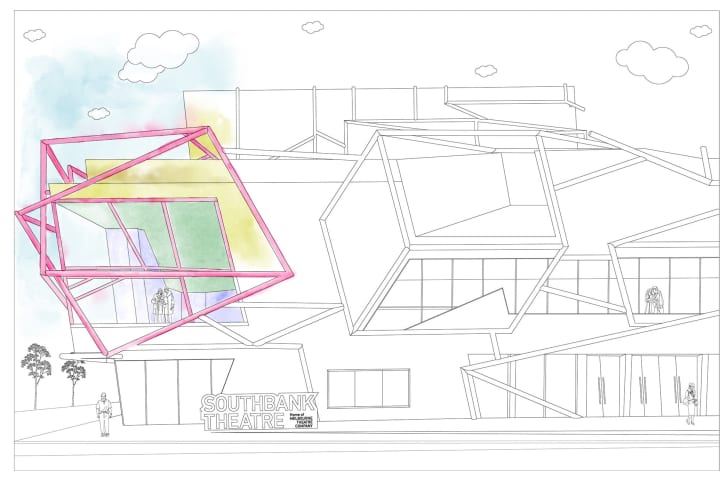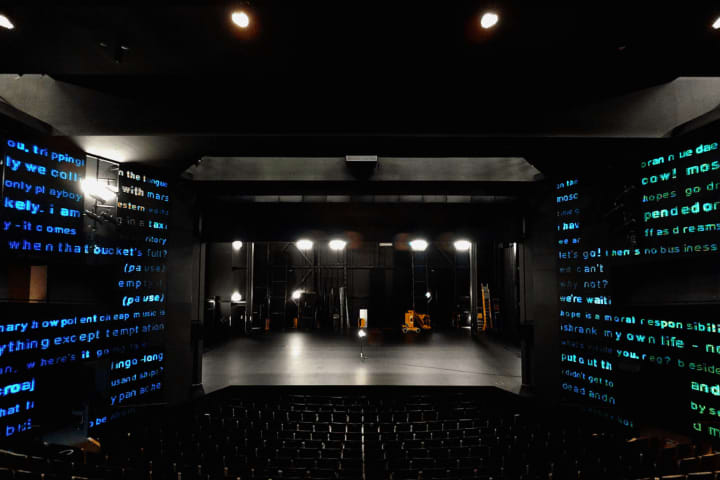In theatre, a production manager is the intersection between the art and the business; they make creative concepts a reality. Acting as the funnel of all production information, they need to be efficient, organised, have a sound knowledge of technical theatre, and the ability to work with a diverse group of people.
In initial planning stages, the production manager is given a budget, and a list of parameters to which the production must adhere. From that point on, it is their responsibility to steer the team to ensure the show is delivered safely, on time and in budget.
‘A production manager must be a good communicator and listener; be respectful of all people’s opinions and issues; and must be able to think quickly and respond to an ever-changing environment in a calm and controlled manner.’ – Senior Production Manager Michele Preshaw
For a production manager, every day is a different adventure and their work varies as much as the shows they produce. Some days are spent in front of their computer responding to emails, writing risk assessments or schedules, and creating spreadsheets (lots and lots of spreadsheets!). Sometimes they will be in the rehearsal room, supporting the stage manager. Other days they’ll be bumping in a show, rigging lights in the theatre, and running technical rehearsals. At any given time, an MTC production manager may have three to four productions to manage, all at various stages in the process.

Senior Production Manager Michele Preshaw (second from left). Photo: Lachlan Woods
From Design to Opening Night
During the initial design phase, the production manager collaborates with designers and department managers to workshop designs and concepts that are achievable, and safe, within the manufacture timeframe, budget and production parameters. Once a design is finalised, and plans are drawn, the production manager works with department managers to supervise the build. Keeping an eye on the bigger picture, the production manager confers with propmakers, electricians, carpenters, scenic artists, costume makers, milliners and the design office to ensure everyone has the resources and information they need to do their work, and to do it safely.
‘Production management feels like a good fit because it marries my two loves: theatre, and a really good spreadsheet!’ – Production Manager Abe Watson
When rehearsals begin, the production manager runs weekly meetings for the entire team. There are many stakeholders in a production and in a company like MTC, which produces a considerable amount of original work, a lot of changes come out of the rehearsal room. Production meetings are essential to ensure everyone is on the same page. The production manager also works closely with the stage manager during rehearsals, to ensure all requirements are met. As rehearsals progress, the production manager’s focus turns to bump in: They gather lighting, sound and rigging plans, and schedule the production week, accounting for every minute of activity between bump in and opening night.

Production Manager James Lipari at work in the theatre. Photo: MTC
Once in the theatre, the production manager supervises the bump in. They ensure activities run to schedule, and any unexpected issues are solved as soon as possible. With the stage manager, they run technical rehearsals and ensure effects are safely rehearsed, and performers feel comfortable. The production manager continues to support the production during previews, watching the show from the auditorium and taking notes.
‘The best part of my job is opening a show and seeing the joy it has brought the audience combined with the sigh of relief that all the planning and execution went well.’ – Production Manager James Lipari
Once the show has opened, the production manager will be back in the office catching up on their other shows, but they talk regularly to the stage manager to ensure any issues that arise during the season are addressed ASAP. They return to the theatre at the end of the season when it's time to supervise bump out and pack the truck.

Production Manager Abe Watson prepares a schedule for bump in. Photo: MTC
Meet the MTC Production Managers
MTC employs three Production Managers to manage the season: Senior Production Manager Michele Preshaw, as well as Abe Watson and James Lipari. We asked them a little more about the job…
How do you explain to other people what you do?
Michele Preshaw
‘I facilitate the production from the design phase to bumping out onstage. I support the creative vision but also the necessary financial and time constraints placed on that vision by the Company.’
Abe Watson
‘My involvement on a production lasts from initial design phase to bump out. I’m responsible for realising the visions of the company and creative team within the constraints of technical, logistical and financial possibility. Predominately, I supervise production departments and staff to ensure productions are delivered safely, on time and on budget.’
James Lipari
‘My simplistic response for those without a background in theatre is: I manage the implementation of everything from the curtain back.’
What skills are needed to be a production manager?
James Lipari
‘The most important skill for a production manager is having a strong understanding of the entire artistic process: directors, designers, department heads and crew will have varying priorities, deadlines and challenges at different stages, it is up to the production manager to effectively manage these pressure points to ensure a cohesive process.
‘The ability to work with intricate details whilst remaining aware of the bigger picture is essential.
‘I think ultimately it boils down to four key skills: time management, the ability to work well under pressure, creative problem solving and empathy. If you have those four, the other aspects of the job will come naturally.’
Michele Preshaw
‘A good communicator and listener. Be respectful of all people’s opinions and issues. And you must be able to think quickly and respond to an ever-changing environment in a calm and controlled manner.’
Abe Watson
‘You need to have a sound understanding of the entire artistic process. Different departments will have different priorities, challenges and deadlines at different stages in the production process. It is the job of the production manager to ensure departments have what they need, when they need it.
‘A production manager must be an excellent communicator. Theatre can be high-risk, so clear directives are important to ensure everyone is kept safe at all times. Written communication is just as important; a production manager will write any number of schedules, email communications and procedural documents that direct the actions of dozens of people. Clarity is key.
‘Production management is people management, so you must be empathetic and approachable. The production process can get stressful. When a production manager is accessible and approachable to any and all members of the team, issues are nipped in the bud quickly and easily.
‘A production manager must have attention to detail, as well as keeping sight of the ‘bigger picture’ to ensure work progresses smoothly.
‘Sometimes, things don’t go to plan. A good production manager is able to think quickly on their feet, diagnose a problem and determine the best course of action. Also, things change – and no matter how beautiful and well-thought-through that 300-line production schedule of yours is, you will have to re-write it three times before bump in, and that’s okay.
‘Arguably the most important is a good sense of humour. It’s a stress-buster, a morale booster, it puts others at ease and it encourages good teamwork.’
How did you end up as a production manager?
Abe Watson
‘I come from a community theatre background. I started with Bendigo Theatre Company when I was eight, and never really left! I started acting in shows, then found my way into the technical side (lighting), then onto the committee, then as a production manager. My first casual job, at 14, was at The Capital in Bendigo as a Lighting Technician. After that, I moved around in that business for a fair bit, working in operations, bookings, event management, and eventually managing Front-of-House services.
‘I think my curiosity was what led me to production management; I was so fascinated by all the various roles it takes to put a production on that I couldn’t stop until I’d tried them all! Production management feels like a good fit, because it marries my two loves: theatre, and a really good spreadsheet!’
Michele Preshaw
‘I was a lighting designer and technician, but was given an opportunity at an early age to be production manager for a venue and learnt on the job.’
James Lipari
‘I’ve always had production in my blood; my mother was a production manager at ABC television and I spent many nights in “after-school care” at the studios. In some ways it was inevitable.
‘Career-wise, I graduated the VCA in 2012 with a major in lighting and a minor in stage management. It was never my plan to be a production manager, however having a technical knowledge combined with a background in stage management quickly thrust me into production/technical management for many small-to-medium companies who needed to combine multiple roles. From there, the rest is history.’
What are the best parts of your job?
Michele Preshaw
‘The creative people and changing environment.’
Abe Watson
‘Learning something new every day. No two production processes are the same, and I’m a firm believer that you learn something new on every single show. You also spend your days around geniuses who make the impossible possible. It’s pretty amazing.’
James Lipari
‘Opening a theatre show or festival and seeing the joy it has brought the audience combined with the sigh of relief that all the planning and execution went well.’
Follow Willow, honorary production manager furball, on Instagram: @willowvonruff
Published on 29 May 2020





